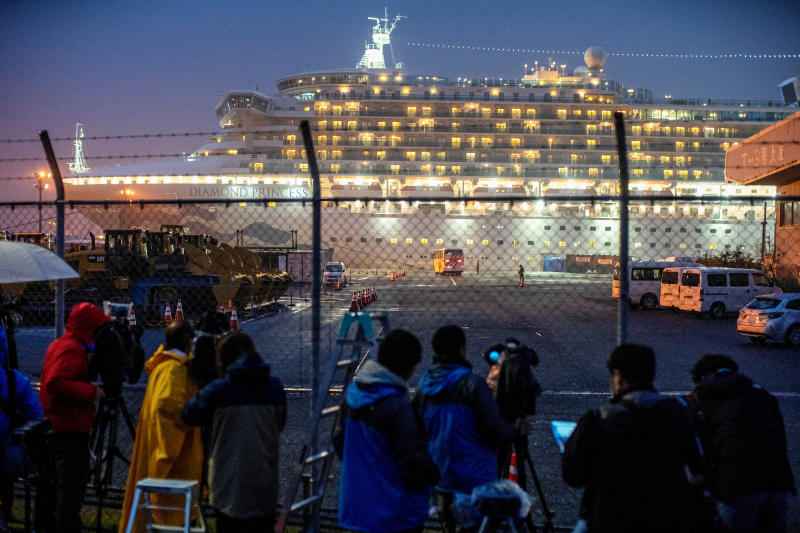Coronavirus: Japan's Prime Minister Shinzo Abe calls for 'basic policy' to fight spread of disease
Sign up now: Get insights on Asia's fast-moving developments

A bus arrives near the cruise ship Diamond Princess in Yokohama, Japan, on Feb 16, 2020.
PHOTO: REUTERS
TOKYO - With the third death linked to the Diamond Princess cruise ship on Sunday (Feb 23) and the number of coronavirus cases continuing to rise in Japan, Prime Minister Shinzo Abe stressed the urgency to develop a "basic policy" to curb the spread of the virus.
The priority, he said at the 12th Cabinet meeting against Covid-19, is to build a system that can slow the speed of infections and prevent sick patients from falling severely ill.
He delegated this task to Health Minister Katsunobu Kato, as he noted the outbreak is in a "crucial phase" as there are patients in multiple areas where the chain of transmission is unknown.
Japan is considering using Avigan, an anti-flu drug, to treat patients of the coronavirus disease. Mr Abe noted that some hospitals have begun administering the drug to patients, and urged all-out efforts to find an effective treatment.
The meeting comes as Japan reported another 12 cases on Sunday (Feb 23), comprising nine in Hokkaido, two in Aichi and one in Chiba. This brings the total on land to 147.
Separately, Japan confirmed another 57 cases - 55 crew members and two passengers - on board the Diamond Princess cruise ship, docked off Yokohama, bringing the total infected to 691.
A Japanese man in his 80s died on Sunday, becoming the third fatality linked to the cruise. Health authorities said the cause of death was pneumonia, declining to elaborate if he died of Covid-19 as his family had not given consent.
There is already withering international scrutiny on Japan's quarantine measures on board the Diamond Princess, which has been described in foreign media as an "incubator" and a "petri dish" for the coronavirus.
The 691 confirmed cases do not include at least 28 cases, including one Japanese woman in Tochigi, who were given clean bills of health to disembark - only to test positive for the coronavirus later.
"We take very seriously the fact that positive cases have appeared after disembarkation," Mr Kato told reporters, though he said that Japan does not have any comprehensive data that can be analysed at this time.
Meanwhile, the United States raised its travel alert for Japan to level two on a four-tier scale on Saturday, citing the "sustained community spread" from unknown infection routes and calling for "increased caution".
Japan's tourism sector is taking a major hit from the coronavirus. Ishiya, the Sapporo-based maker of the famous Shiroi Koibito (white lover) cookies, is stopping production from Feb 20 to March 15 to cut its losses over falling sales.
The popular Ghibli Museum, which showcases the works of renowned animator Hayao Miyazaki of Spirited Away fame, will close from Feb 25 to March 17.
Museum director Kazuki Anzai said those who had booked tickets will be refunded, adding: "We concluded that curbing the spread of the infection is more important now."
The spread of the coronavirus has also led to bullying and discrimination of doctors and nurses in Japan, who put themselves on the frontline.
They were deployed as part of the volunteer-based Disaster Medical Assistance Team to attend to evacuees on chartered flights from Wuhan, as well as to passengers and crew on board the Diamond Princess.
But the Japanese Association for Disaster Medicine noted that these frontline workers have been treated like "germs" and discriminated even by their colleagues, with their children asked by school officials not to go to school and one medical professional asked to apologise to his superior for taking part in the mission.
"This is unbelievable and unjustified," the association said. "This is a serious human rights issue, and we demand the situation be corrected."


